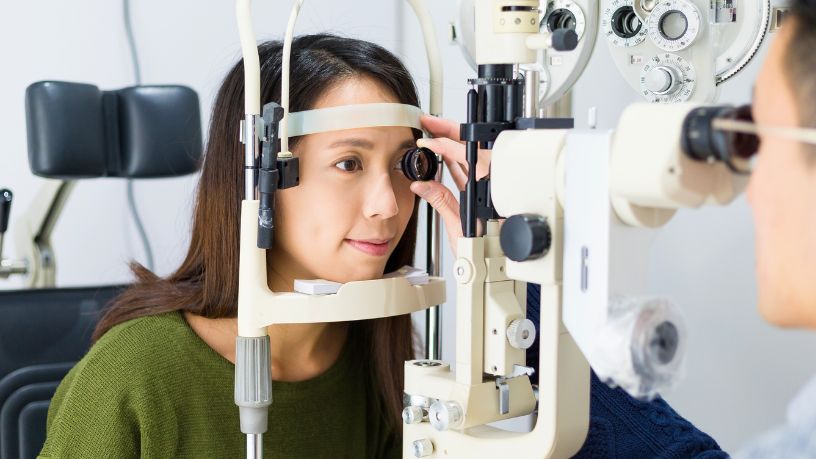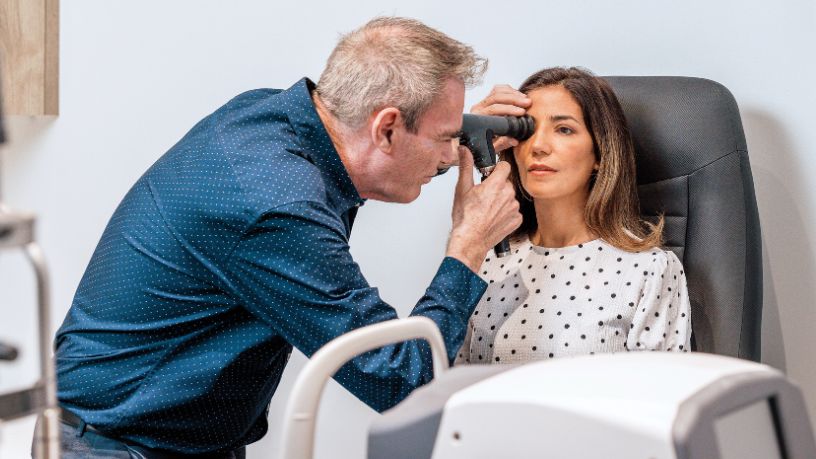On this page
Key takeaways
- Contact lenses are thin, rounded optical aids that are placed on the surface of your eyes to correct your vision.
- Lenses are typically available in daily or reusable options.
- Discover expert tips for choosing and caring for your lenses.
If you have a vision condition, you may have considered getting a pair of contact lenses. But are they right for you?
Let’s explore the basics of contact lenses, plus some of the essentials of taking care of them and your eyes.
What are contact lenses?
Contact lenses are thin, rounded lenses that are typically made from a special type of plastic. They’re designed to sit on the surface of your eyes in the tear film to help correct your vision, in place of glasses.
Lenses can help a number of vision conditions, including short-sightedness, long-sightedness and astigmatism.
Getting your first pair of lenses
There’s a variety of reasons why you might choose to wear contact lenses instead of (or in addition to) regular glasses. It might be for appearance reasons, because of your work or hobbies, or just because you want to take a break from your frames!
If you’re interested in wearing contact lenses, it’s important that you discuss it with your optometrist first, as not everyone is an ideal candidate for them (for instance, if your eyes can’t naturally lubricate themselves or if you’re prone to eye infections).
If lenses are right for you, your optometrist will do some measurements of your eyes, including their curvature, so they can recommend the right type for you. They may also recommend a pair of trial lenses, which you can wear for a short period and report back on.
Your optometrist will also teach you how to put in and take out your lenses and discuss how to take care of them and your eyes.
Choosing the right contact lenses
Contact lenses come in many shapes, sizes, colours and tints. Also, daily disposable and reusable lenses.
Daily disposable lenses are worn for one day and then thrown out, while fortnightly and monthly replacement lenses can be used for multiple days before discarding them, provided they are removed, cleaned and stored in disinfecting solution each night.
Extended-wear lenses can be used for longer periods (usually a week or 2 but sometimes up to a month), and may be suitable for overnight wear for some people.
The current trend in prescription contacts is definitely towards daily disposable lenses.
The major advantage of daily disposable lenses is that:
- they’re safer (reusable lenses carry a higher risk of infection)
- they don’t require cleaning
- you get a fresh pair every day
- they tend to be more convenient
- there will usually be spare pairs available for emergencies.
I also find that daily disposable lenses are ideal if you plan on alternating between lenses and glasses.
Contact lenses are most commonly made with soft materials (soft contact lenses), with soft daily disposables by far the most popular variety.
Hard contact lenses (also known as rigid gas permeable lenses), which are made from a malleable plastic that allows oxygen to pass through the lens to the eye, may be helpful for people with certain eye conditions or allergies.
How to care for your contact lenses
Always wash your hands before handling contact lenses
Follow specific advice
Properly clean reusable lenses
Never re-use solution
Keep your lens case clean
Get regular check-ups
If you wear contact lenses, you may need to book in check-ups with your optometrist more frequently than when wearing glasses. Contact lenses carry a higher risk of infection compared to glasses, so it’s important to ensure that your eyes are adequately monitored.
You should also book in appointments for replacement lenses ahead of time, so you don’t risk running out.
Keep a spare pair of lenses
Don’t place a new contact lens on top of one you’re already wearing
This might seem like a no-brainer, but: Always make sure that you’ve taken out your old lens before placing a new one in!
Placing a new lens on top of an old one can be dangerous, as it may put excess pressure on your eye and could distort your vision, as well as not being very comfortable!
Book an eye test
Find and book your preferred spot at your local Bupa Optical store.

At Bupa, trust is everything
Our health and wellbeing information is regularly reviewed and maintained by a team of healthcare experts, to ensure its relevancy and accuracy. Everyone's health journey is unique and health outcomes vary from person to person.
This content is not a replacement for personalised and specific medical, healthcare, or other professional advice. If you have concerns about your health, see your doctor or other health professional.
You might also like
Eye checks: A health essential
Getting to the optometrist every 2 years might not always be at the top of your mind, but did you know an eye check can detect more than just vision loss?
Why sunglasses are more than a fashion accessory
Sunglasses are a stylish accessory, but more importantly, they also protect your eyes from UV. Here’s how to find the perfect pair.
How an eye test could save your life
Did you know that a routine eye check can detect serious health conditions? Find out how this non-invasive test could help you protect your health.
Do blue light glasses help eye strain?
The blue light from your devices may be causing you eye strain. Can blue light glasses help?





